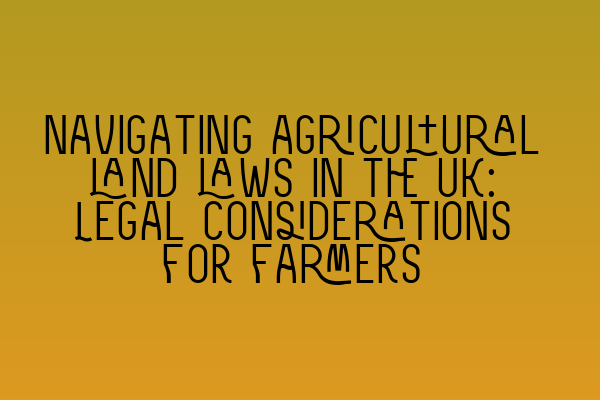Navigating Agricultural Land Laws in the UK: Legal Considerations for Farmers
Welcome to our comprehensive guide on navigating agricultural land laws in the UK. As a farmer, understanding the legal aspects of agricultural land ownership is crucial for ensuring compliance, protecting your interests, and mitigating potential risks. In this article, we will explore key legal considerations that every farmer should be aware of.
1. Agricultural Tenancies
One of the first legal considerations for farmers is understanding agricultural tenancies. These tenancies are regulated by the Agricultural Holdings Act 1986 and the Agricultural Tenancies Act 1995. They determine the rights and responsibilities of both landlords and tenants in relation to agricultural land.
For a detailed guide on agricultural tenancies, check out our article on Legal challenges in property transactions: A comprehensive guide. It covers the key provisions of these acts and provides insights on common challenges faced by landlords and tenants in agricultural tenancy agreements.
2. Planning Permission and Development
When considering any changes to your agricultural land, such as building new structures or converting agricultural buildings for non-agricultural use, it is essential to understand the planning permission process. The planning system in the UK is regulated by local planning authorities, and obtaining the necessary permissions is crucial to avoid potential legal issues.
To learn more about navigating planning permission in property transactions, read our article on Dominate Property Law Questions: Avoiding Common Pitfalls. It provides valuable insights into the legal considerations for obtaining planning permission and highlights common pitfalls to avoid.
3. Environmental Regulations
As a farmer, you must be aware of the environmental regulations that apply to agricultural land. These regulations aim to protect the environment and ensure sustainable agricultural practices. Key regulations include the Environmental Stewardship Scheme, Cross Compliance, and the Nitrate Vulnerable Zone (NVZ) regulations.
To get a comprehensive understanding of the environmental considerations in land law, refer to our article on Environmental Ethics in Land Law: Balancing Development and Sustainability. It explores the ethical aspects of land law, including environmental concerns, and provides insights into achieving a balance between development and sustainability.
4. Farm Business Tenancies
For farmers who rent their agricultural land, understanding farm business tenancies is crucial for protecting their interests. Farm business tenancies are regulated by the Agricultural Tenancies Act 1995 and provide tenants with certain rights, including security of tenure and the ability to undertake agricultural activities.
To ace your exam preparation on land law, including farm business tenancies, check out our article on Land Law Revision Tips: Ace Your Exam Preparation. It provides helpful tips for revising land law topics and ensures you are well-equipped to tackle any land law-related questions.
5. Agricultural Subsidies
The agricultural sector in the UK benefits from various subsidies and support schemes. It is crucial for farmers to understand the eligibility criteria, application process, and compliance requirements associated with these subsidies. Common schemes include the Basic Payment Scheme (BPS) and the Countryside Stewardship Scheme.
Mortgages and land law play a significant role in property transactions, including agricultural land. To gain insights into the essential considerations for property transactions involving mortgages, refer to our article on Mortgages and land law: Essential considerations for property transactions. It covers the legal aspects of mortgages, including their impact on property transactions.
Conclusion
Navigating agricultural land laws in the UK can be complex, but armed with the right knowledge, you can protect your interests and ensure compliance. From understanding agricultural tenancies to complying with environmental regulations, these legal considerations are essential for any farmer. Always seek professional advice when dealing with legal matters, as expert guidance can help you navigate the complexities of agricultural land laws.
